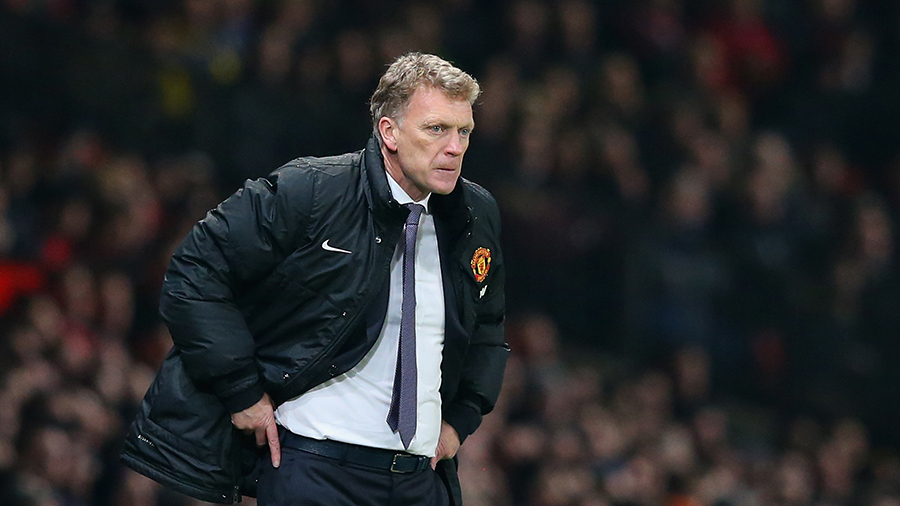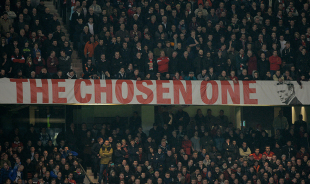- Premier League
Why United fans should be afraid, very afraid

A pragmatic coach who followed a no-nonsense manager. A squad that was by turns both successful and threadbare. New signings who failed to impress and disillusionment in the stands. Cup exits and a mid-table berth at season's end. Swashbuckling displays replaced by confounding tactics. Ring any bells?
No, it's not a summary of the situation at Manchester United at the start of the David Moyes era. It is a synopsis of Dave Sexton's time at Old Trafford and fans would have to turn a deaf ear not to hear the echoes.
Moyes' debut season is set to end with club's lowest league position since 1990, they are trophyless and, barring a late and unlikely rally, facing the prospect of a year without European competition for the first time in 24 years.
Unwanted landmarks are mounting at an alarming rate with the latest nadir reached with the 3-0 loss to Manchester City.

And, as if losing to the noisy neighbours at home - emphatically, and for the third time in succession - wasn't bad enough, the result meant United have now lost six league matches at Old Trafford for the first time since the 1978 - when Sexton was in his first season as United manager.
Sexton's arrival in the summer of 1977 also followed the reign of a Glaswegian with a large personality and even larger ego.
He was seen as a safe option by the United board after Tommy Docherty's dismissal for having an affair with the club physio's wife but, despite previous success with Chelsea, where he won the FA Cup and Cup Winners' Cup in 1970 and 1971 respectively, he failed to match with a telling impression at Old Trafford.
Sexton inherited a capable starting XI from Docherty, if not a particularly deep squad. His predecessor remains United's most prolific recruiter in United's history, signing 34 players in his five seasons at Old Trafford, but Sexton had his own ideas about team building.
Gordon McQueen, Joe Jordan, Ray Wilkins, Kevin Moran and Gary Bailey all joined the club and went on to enjoy varying degrees of success. However, it was the signing of striker Garry Birtles from Nottingham Forest for £1.25 million that came to epitomise Sexton's reign - the forward waited 11 months for his first goal for United, finally scoring in his 30th game.
Docherty had overseen what in modern football parlance would be considered a team in transition. The sad spell towards the end of George Best's United career was over three days before he joined the club; relegation, promotion and two FA Cup finals would follow before his ignominious departure - but it was the attacking character of his team that defined Docherty's United - that and those two trips to Wembley.
In the wake of Docherty's bombastic presence Sexton's quiet manner and dislike of speaking to the press led them to dub him "whispering Dave." In his first season, United finished 10th in 1978, 24 points adrift of champions Nottingham Forest - and this in the days when two points were awarded for a win.
In four years, Manchester United failed to win a trophy under Sexton and, for all his commitment to the Dutch model of Total Football, his teams were typically defensive and conservative. In his first match in charge they shared the Charity Shield with Liverpool after a 0-0 draw, a result that set the tone for his reign.

The supporters soon became restless; Liverpool were dominating the English game and United could not even sustain an entertaining brand of football.
A 1979 FA Cup final defeat by Arsenal and second place in the league a year later was as close as Sexton came to breaking his duck. He was sacked in April 1981 as United finished eighth. Seven successive wins at the end of his reign weren't enough to save his job, and Ron Atkinson took over two months later.
For all that, few doubted Sexton's character and integrity, and recognised his credentials as a student of football. During his time at Old Trafford he served as England's Under-21 manager, a role that he continued after leaving United, leading sides containing players such as Justin Fashanu, Sammy Lee, Mike Duxbury, Mark Hateley and Mark Chamberlain to European glory in 1982 and 1984.
He later joined Atkinson at Aston Villa in 1992, who described him as "the best technical coach in the country" and praised his focus on ball skills at a time when the lack of technique in the English game was exposed mercilessly in Europe. It simply didn't work out for him at Old Trafford.
By the standards expected of the third-richest club in the world, there are an increasing number who believe it will not work out for Moyes, either. The omens, certainly, are not good.
What can United learn from Sexton's time in charge?
Six years is an eternity in football.
It goes without saying that Sir Alex Ferguson's 27 seasons in charge at Old Trafford is an exceptional time in charge of a club. Manchester City had 14 different managers during that time; Chelsea 18; and Real Madrid 24. Yet Moyes penned a six-year deal when he joined United.
Why did the club agree to such a long-term deal? At the Etihad, fellow summer arrival Manuel Pellegrini is operating with a three-year contract. Jose Mourinho, already a known entity at Chelsea, signed a four-year deal on his return to the club. Brendan Rodgers, three years.
If the length of the contract was simply grandstanding, highlighting their belief that they had brought the right man in for the job, it has the makings of an embarrassing - and expensive - mistake. It was more likely an expression of faith, underlining that Moyes would be given time in the role to bring success to Old Trafford.
Wilf McGuinness and Frank O'Farrell lasted little more than a season at United, but since 1972 no manager has served for any less than Sexton's four years in charge. As a result, United have a history of sticking with their managers - but are they guilty of being loyal to a fault?
'Playing the United way' goes beyond results.
Tommy Docherty's United may have been relegated in his second season, but he persevered with the club's attacking style, leading them to Wembley twice and keeping the supporters happy. Sexton came with a very different view of how the game should be played - one that didn't gel with the players or the fans.

Moyes? Well, it's hardly been a tactical masterclass. There was the 2-2 draw against Fulham, when United put 81 crosses into the box with only 18 finding a team-mate - Fulham defender Dan Burn said he had not headed that many balls since playing in the Conference.
The lack of game time for Shinji Kagawa, one of United's most creative midfielders, remains something of a mystery. Against Liverpool at Old Trafford, United managed a single shot on target in a 3-0 defeat, their lowest return in five years.
How much of this is down to the nature of United's squad, with Moyes attempting to blend ageing players with new signings in new formations, is open to debate. Efforts to sign Cesc Fabregas, Leighton Baines, Fabio Coentrao, Ander Herrera and even Cristiano Ronaldo all fell flat, leaving Moyes with Marouane Fellaini and Juan Mata - signed for a combined £70 million.
Mata is yet to score for United, while Fellaini has become a focal point for Moyes's fortunes on the pitch, appearing unsuited to an otherwise fast-paced team and at times out of his depth.
Sometimes it just doesn't work out.
Following Ferguson was always going to be a daunting task, but the man himself and the United board believed they had the right man in Moyes. "When we discussed the candidates that we felt had the right attributes we unanimously agreed on David Moyes," Ferguson said at the time of his appointment. "David is a man of great integrity with a strong work ethic. There is no question he has all the qualities we expect of a manager at this club."
The right attributes. Great integrity. Qualities expected of a United manager. Like Sexton after Docherty, Moyes ticked all the right boxes, but it appears that the intangibles are responsible for the failure to pick up where Ferguson left off at Old Trafford.
There were early signs, such as Moyes' decision to dispense with the services of Ferguson's long-serving coaches, bringing in Phil Neville and his Everton back room staff. As Eric Steele, the discarded goalkeeping coach, put it: "You had the United perspective - [Ferguson] saying, 'Keep what we've got, keep the continuity, work with them and they'll guide you through. You're taking on a massive machine here. You've gone from Marks and Spencer's to Harrods."
Talk of unrest among the players has further undermined Moyes. Rooney has signed a new deal but a number will move on in the summer. The fear factor is fading at Old Trafford, there is talk of boardroom figures turning against him, abuse for Sir Alex Ferguson from fans at Old Trafford and the ignominy of having to assign security guards to protect the 'Chosen One' banner erected in Moyes's honour. If ever there was a metaphor for the manager's current predicament …
The powers that be at Manchester United face a decision that nobody at the club has had to make since the early days of Ferguson's reign: to stick or to twist. United face a defining summer, one that will see a significant change in the make-up of the team with departures and the promise of a £100 million transfer war chest.
Is David Moyes the man United thought he was? Is he the man to lead them back to glory? Time will tell. But make no mistake - United have been here before.

